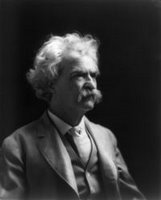
I thought I would answer some of the questions or search strings that bring people to this Fahrenheit 451 site.
"was twains use of racial language in huck finn a slur or dialogue of the times?"
According to Shelley Fisher Fishkin, in an article entitled Mark Twain's America,
The question of whether the presence of the word "nigger" makes "Huckleberry Finn" racist should be looked at in the context of the novel as a whole. Throughout the book, Twain portrays a racist society through the eyes of a child who buys that society's assumptions. The book is the compelling saga of how, on a personal, existential level, that child ends up choosing to violate his culture's norms by not turning Jim in and by coming to recognize that he is, indeed, a human being rather than a mere piece of property. Twain presents a devastating critique of the racism of a society that classifies Jim as less than human. The word "nigger" is central to portraying both that society and the people in it with chilling accuracy.
Shelley Fisher Fishkin is Professor of American Studies at the University of Texas in Austin. She edited the 29 volume "Oxford Mark Twain," wrote the award winning book "Was Huck Black: Mark Twain and African American Voices" and is President-elect of the Mark Twain Circle of America.
According to Wikipedia,
In the United States, the word was freely used by both whites and blacks, until the Civil Rights Era of the 1960s. A striking example is in televised coverage of a march in Birmingham, Alabama, when protesters, led by Dr. Martin Luther King, were met with attacks from dogs and fire hoses. A white woman from another Alabama county was interviewed. Visibly upset, she said, "It's not right. We don't treat niggers like that here." Louisiana Governor Earl Long also used the term when advocating expanded voting rights for "African Americans." At that time, the term was less noteworthy than the expressions of support by white southerners, as it was a common regional term for blacks, along with Negro and "colored." Similar uses of the word were made by Mark Twain and Charles Dickens, and Joseph Conrad published The Nigger of the 'Narcissus' (1897) without racist intent.
My own opinion is that Mark Twain was using the language used within the framework of his own experience and he did not see blacks quite the same way as people in his society did. Anyone who has read The Adventures of Huckleberry Finn will attest to the portrayal of Jim as one of the most intellegent characters in the book. In my opinion, Twain deliberately had Jim and Finn become friends to cross the racial barrier. Although the word "nigger" may have been recognized as a racial slur, it was certainly used freely within the society in which Huckleberry Finn and Tom Sawyer would have lived if they were real characters.
Read Tom Sawyer or Huck Finn online or download other e-versions along with other Mark Twain titles. The Adventures of Tom Sawyer is available with searchable text, as is Adventures of Huckleberry Finn.
1 comment:
Thank you for your comment. It sounds like a very interesting book. I was debating whether to use the "N-word" in the entry itself but felt that a) because the site is about censorship, I should not self censor and b) because there may be some people who may not have read either book, they would not know what racial slur we were talking about.
It would be interesting to find out from international readers whether they have racial terms that are no longer acceptable and would be purged from their vocabulary.
Any thoughts anyone?
Post a Comment